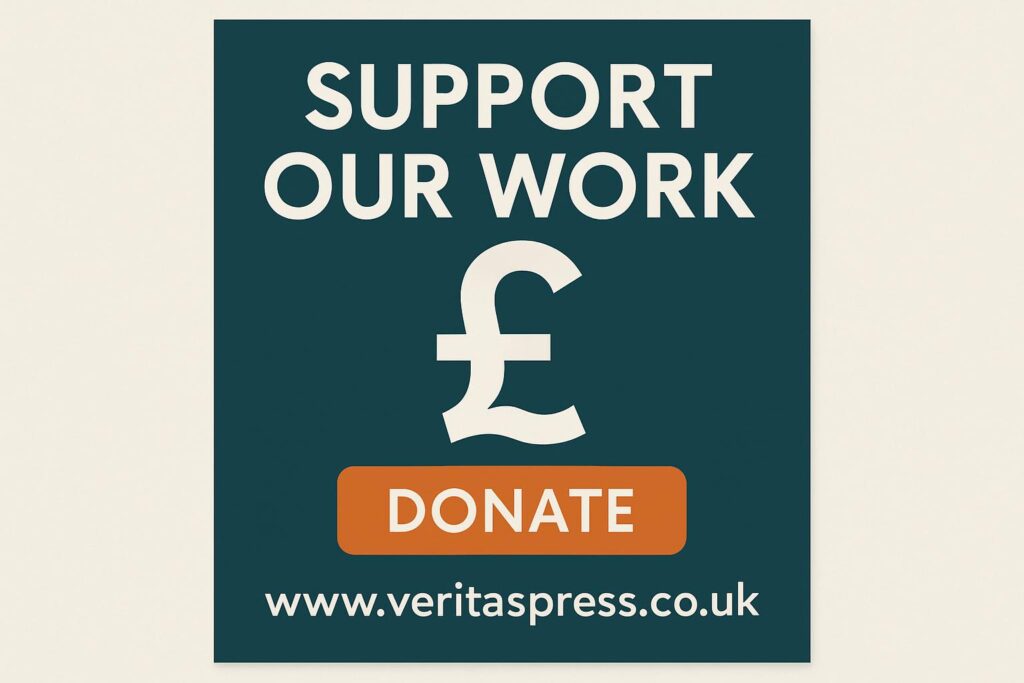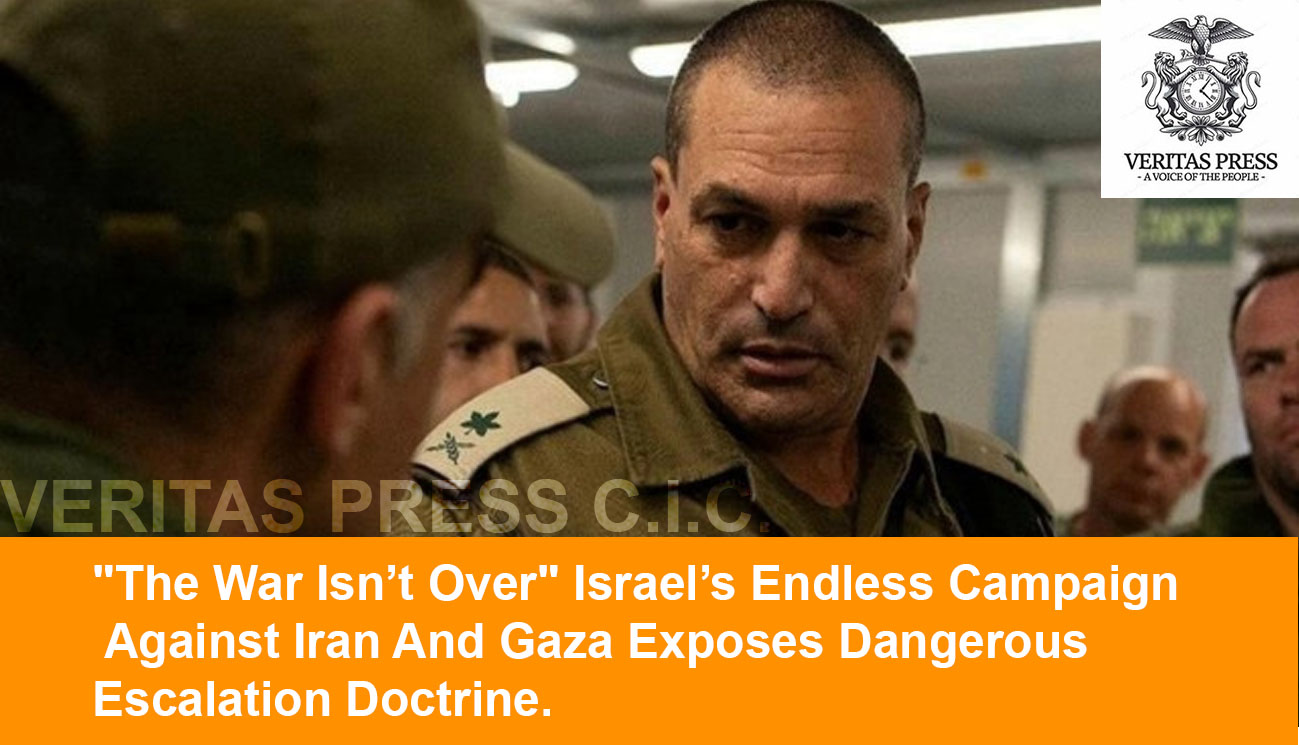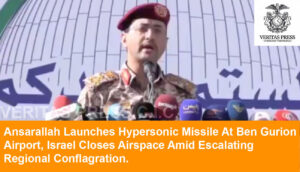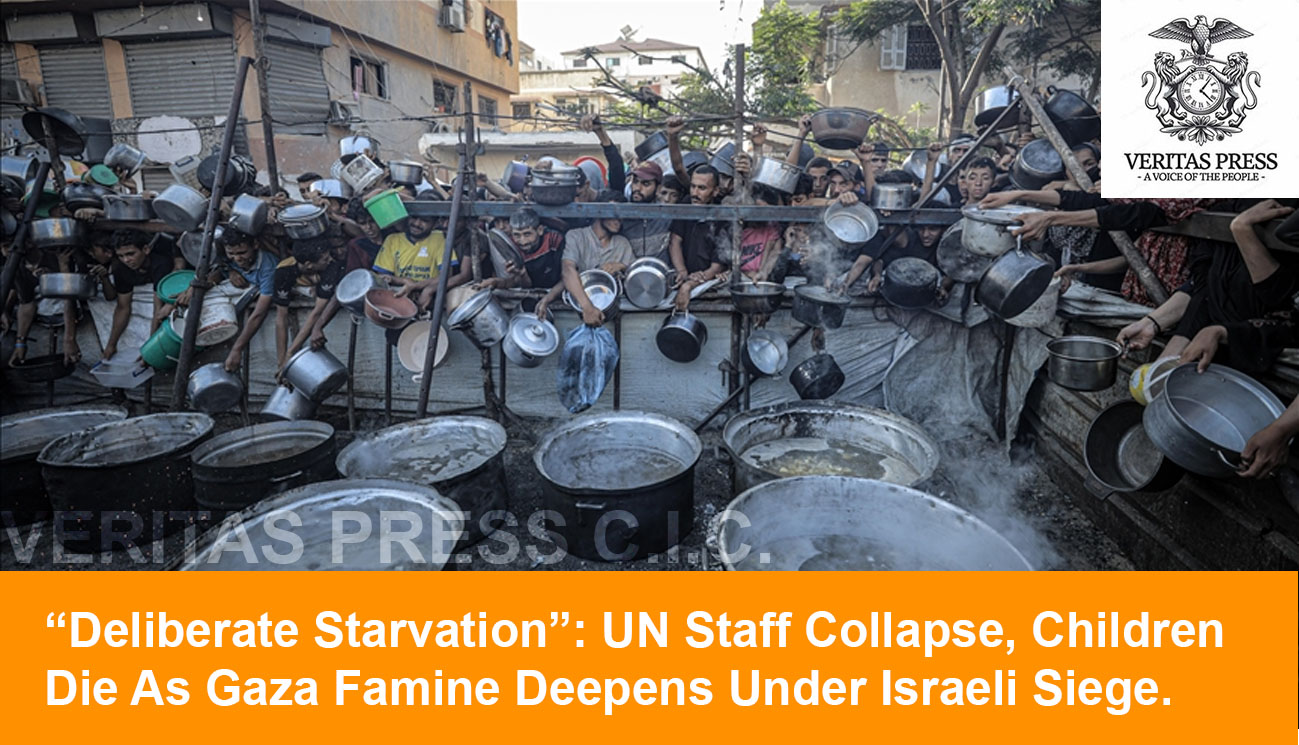Press Release: Veritas Press C.I.C.
Author: Kamran Faqir
Article Date Published: 22 July 2025 at 13:18 GMT
Category: West Asia | Iran |
Source(s): Veritas Press C.I.C. | Multi News Agencies

Despite ceasefire, IDF chief vows continued offensive amid mass civilian killings, rising global alarm, and unaccountable military aggression.
Israel’s top military commander has declared that “the campaign against Iran is not over,” hours after a fragile ceasefire paused one of the most direct confrontations between the two regional adversaries in decades. But the statement by Chief of Staff Lt. Gen. Eyal Zamir, delivered as Gaza reels from yet another massacre of aid-seeking civilians, has raised critical questions about Israel’s strategy, its disregard for international norms, and a growing appetite for war under the veneer of deterrence.
A Doctrine Of Perpetual Escalation:
Zamir’s remarks were stark: “Iran and its axis remain in our sights; the campaign against Iran is not over.” Delivered during a high-level military assessment on Tuesday, his words were accompanied by renewed pledges to pursue military operations not just in Gaza, but across Lebanon, Syria, and the West Bank, a strategy some analysts are now calling a “doctrine of perpetual escalation.”
“This isn’t strategic defence anymore, it’s systemic aggression dressed up as national security,” said Dr. Hanan Mahfouz, a Lebanese military analyst based in Beirut. “By keeping the Iranian ‘axis’ constantly in its sights, Israel is manufacturing justification for endless war, regionally and domestically.”
The timing of Zamir’s statement, coming just after the announced ceasefire between Iran and Israel, has been condemned as provocative and destabilising. “Israel is effectively signalling that there is no off-ramp,” said Trita Parsi, executive vice president of the Quincy Institute. “Even when the shooting stops, their war continues in other forms, cyberattacks, assassinations, bombings in third countries. It’s not peace; it’s pursuit.”
Gaza: ‘One Of The Most Complex Wars’ Or A Humanitarian Catastrophe?
While Zamir hailed the IDF’s achievements in Gaza, calling the conflict “one of the most complex the IDF has ever known,” residents and aid organisations painted a grimly different picture.
On Tuesday alone, at least 46 Palestinians were shot dead by Israeli forces while attempting to collect humanitarian aid, according to the Gaza Ministry of Health. Eyewitnesses described scenes of panic and horror. “There was no warning. They opened fire as people were running for food,” said Yassin Abu Sha’ar, a 28-year-old survivor near Nuseirat. “We were told to come. We were told it was safe.”
Doctors Without Borders (MSF) condemned the killings as “yet another massacre of civilians under the guise of military necessity.” UN Special Rapporteur Francesca Albanese wrote on X: “How many more must starve or be shot before accountability becomes more than rhetoric?”
Human rights groups, including Al-Haq, Amnesty International, and the Norwegian Refugee Council, have called for independent investigations into what they describe as “deliberate targeting of civilians and aid sites.” UN OCHA reports that nearly 70% of aid deliveries in recent weeks have been delayed, blocked, or attacked, often under the coordination of Israeli or US security contractors.
“The humanitarian corridor has become a corridor of death,” said a senior UN official, speaking anonymously. “And the perpetrators are protected by silence and geopolitical alliances.”
The Iran Front: A ‘Victory’ Or Reckless Provocation?
Israel’s latest military operation against Iran, a 12-day campaign of airstrikes on Tehran’s nuclear and intelligence infrastructure, was portrayed by Israeli officials as a stunning success. Prime Minister Benjamin Netanyahu called it a “historic victory that will stand for generations,” while Defence Minister Yoav Gallant claimed the attacks had “set back Iran’s program by years.”
But the cost of this “victory” may be dangerously understated.
The strikes, reportedly conducted with US support and approval, killed multiple senior Iranian officials, destroyed at least three nuclear sites, and brought the region to the brink of a wider war. While both sides claimed credit for the ceasefire, with President Trump boasting that he had “destroyed all nuclear capability”, the Iranian military responded with a chilling warning: “Our finger remains on the trigger.”
Security analysts are not convinced the truce will hold. “What we’re seeing is a ceasefire imposed by exhaustion, not resolution,” said Sanam Vakil, deputy director at Chatham House. “Tehran may lick its wounds now, but the risk of retaliation, direct or via proxies, remains dangerously high.”
And while the Biden administration has remained largely silent, Trump’s grandstanding raised fresh alarms. “It was my great honour to destroy all nuclear facilities and then, STOP THE WAR!” he posted on Truth Social, taking credit for both the offensive and the ceasefire.
But nuclear experts are sceptical of the operation’s effectiveness. “While Israel’s strikes likely caused real damage, it’s doubtful they wiped out Iran’s capabilities entirely,” said Daryl Kimball, director of the Arms Control Association. “Iran’s dispersed enrichment programs and stockpiles make them resilient to air raids. The risk now is that this pushes Iran to accelerate, not abandon, weaponisation.”
Multi-Arena Madness: Syria, Lebanon, And The West Bank:
Zamir’s vision for 2026 includes expanding Israel’s operations across all “arenas”, particularly in Syria, where Israel has conducted hundreds of unacknowledged airstrikes in recent years, and in Lebanon, where daily cross-border fire with Hezbollah risks igniting a new war.
In the occupied West Bank, meanwhile, Palestinian communities report an uptick in nightly raids, home demolitions, and settler attacks, often conducted under IDF cover. “This is not just about Iran or Gaza,” said Nasser al-Kidwa, a former Palestinian diplomat. “It’s a blueprint for regional domination, with impunity.”
Activist group Breaking the Silence, composed of former Israeli soldiers, issued a scathing statement: “We are watching a military establishment addicted to escalation, incapable of ending one war before preparing for the next. The human toll is staggering, but no one in command is held accountable.”
“Historic Victory” Or Strategic Myopia?
Netanyahu’s declaration of “historic victory” belies a deepening strategic quagmire. Critics argue that Israel’s security doctrine has become untethered from long-term stability, fuelled instead by short-term political gains and maximalist military objectives.
“Israel is winning battles and losing the region,” said Alon Pinkas, former Israeli consul general in New York. “You don’t deter Hezbollah by destroying Gaza, and you don’t neutralise Iran by provoking it into war. This is not strategy, it’s survivalist escalation.”
As civilians in Gaza continue to die at food lines and Iranian civilians brace for further strikes, the reality of this regional “victory” is grim.
“The world must stop mistaking power for legitimacy,” said Lama Fakih, Middle East director at Human Rights Watch. “The war crimes in Gaza, the assassinations in Iran, the recklessness in Lebanon, these are not isolated events. They are part of an unrelenting campaign of state violence.”
Conclusion: The Dangerous Delusion Of Military Superiority, And A Strategic Oversight With Global Consequences.
Israel’s assertion that “the campaign against Iran is not over” is more than a military declaration; it is an open endorsement of unending regional warfare, built on the illusion that force alone can achieve security. But beneath the rhetoric of deterrence and national defence lies a calculated pattern of impunity, one that treats international law as optional and human lives, particularly Palestinian, Syrian, Lebanese, and Iranian, as expendable collateral.
The IDF’s expanding multi-front strategy, as articulated by Chief of Staff Eyal Zamir, is not a show of strength but of desperation: a state increasingly reliant on militarism to maintain regional hegemony and internal cohesion. Far from safeguarding Israeli civilians, this relentless escalation has only deepened regional instability, invited future retaliation, and entrenched Israel’s global isolation.
In Gaza, the so-called “most complex war in IDF history” has become a euphemism for systematic devastation. Entire neighbourhoods reduced to rubble. Starving civilians gunned down at food lines. A population trapped between siege, famine, and bombardment, while Israeli leaders speak of tactical gains and strategic objectives.
Meanwhile, in Iran, the assassination of senior officials and the bombardment of nuclear infrastructure have brought the region within inches of a wider conflagration. The ceasefire, brokered not out of diplomacy but exhaustion and U.S. political pressure, may pause direct hostilities, but it does nothing to dismantle the structural forces driving this cycle of violence.
What makes this all the more dangerous is Israel’s growing strategic myopia, particularly its failure to account for the broader geopolitical consequences of dragging the region toward the brink. In targeting Iran so aggressively, Israel risks co-opting major global powers like China and Pakistan into a conflict they have long sought to avoid. Both nations maintain deep strategic and economic ties with Tehran, and both have issued increasingly sharp warnings against regional destabilisation.
“This is not just a Middle East crisis anymore,” said Dr. Arif Rafiq, a geopolitical analyst at the Middle East Institute. “If Israel continues to provoke Iran and its allies without restraint, it risks a spillover that could entangle nuclear powers like Pakistan and draw China more deeply into the regional power calculus. That’s not just reckless, it’s strategic suicide.”
China has already expressed concern over the rising instability, calling for “calm and restraint on all sides.” Pakistan’s foreign ministry warned earlier this week that “further aggression against the Islamic Republic of Iran threatens the security of the entire Muslim world.” Neither nation can afford, nor ignore, an escalatory spiral that might threaten their borders, energy routes, and regional alliances.
Yet Israeli officials appear undeterred, confident that American backing and regional air superiority can contain the fallout. It is a dangerous miscalculation. The prospect of a regional war that draws in nuclear-armed states and global economic powers is no longer unthinkable, it is a fast-approaching reality.
And still, the international response remains muted, fragmented, and complicit. As Western powers applaud Israel’s “restraint” and echo its security concerns, they also enable the very crimes they claim to condemn, through arms sales, diplomatic cover, and silence.
This is not a path to peace. It is the architecture of endless war, now amplified by geopolitical recklessness.
Unless there is a decisive reckoning, one that holds not just Hamas or Iran accountable, but also the Israeli state and its enablers, the region will remain locked in a loop of destruction, repression, and bloodshed. Military victories declared atop mass graves are not victories at all. They are warnings, and history will not absolve those who ignored them.
Advertisements
Tags:





























Leave a Reply